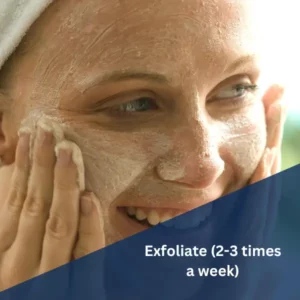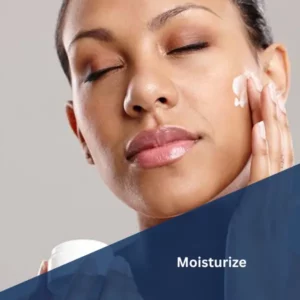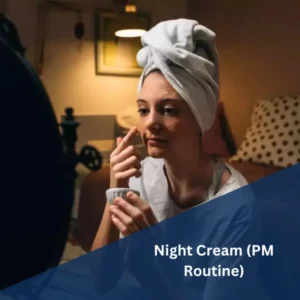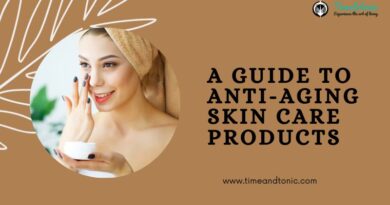11 Best Tips To Build a Skin Care Routine (2023)
Tips To Build a Skin Care Routine – A healthy and radiant complexion is often the result of a well-structured skincare routine. Crafting a personalized regimen can seem daunting with the myriad of products and conflicting advice available.
However, establishing a skincare routine tailored to your unique needs is not only achievable but also essential for maintaining skin health. In this guide, we will unravel the essential tips to help you build a skincare routine that addresses your specific concerns and goals.
From understanding your skin type and identifying problem areas to selecting the right products and mastering the application techniques, we’ll cover everything you need to know to embark on a journey towards flawless, glowing skin.
Whether you’re a skincare novice or a seasoned enthusiast, these insights will empower you to make informed decisions and embark on a path to achieving your skincare aspirations. So, let’s dive into the world of skincare and discover the secrets to a more vibrant and radiant complexion.
Also, Read – Best Ways To Look Best Without Makeup
Importance of a skincare routine
A skincare routine is not merely a luxury or a beauty ritual; it plays a fundamental role in maintaining the health and appearance of your skin. Here are some key reasons highlighting the importance of a skincare routine:
- Skin Health: Just like any other organ in our body, the skin requires proper care. A consistent skincare routine helps in keeping your skin healthy by cleansing away impurities, preventing infections, and promoting cell renewal.
- Prevention of Skin Issues: A good skincare routine can prevent common skin issues such as acne, blackheads, whiteheads, and enlarged pores. By regularly cleansing and exfoliating, you can reduce the chances of these problems occurring.
- Aging Gracefully: Skincare can help slow down the aging process by maintaining skin elasticity, reducing the appearance of fine lines and wrinkles, and preventing age-related issues like age spots and sagging skin.
- Protection from the Elements: Your skin is constantly exposed to environmental elements like UV rays, pollution, and harsh weather conditions. Skincare products like sunscreen act as a barrier, protecting your skin from these harmful factors.
- Boosted Confidence: Clear, healthy skin often leads to improved self-esteem and confidence. When you look good, you tend to feel good, and a skincare routine can contribute to that positive self-image.
- Even Skin Tone: A skincare routine can help in achieving an even skin tone by reducing the appearance of blemishes, scars, and pigmentation issues.
- Customized Care: Everyone’s skin is unique. A skincare routine can be tailored to your specific skin type and concerns, providing you with personalized care and targeted solutions.
- Relaxation and Self-Care: Taking time for your skincare routine can be a calming and self-indulgent experience. It provides an opportunity for self-care and relaxation, reducing stress levels.
- Long-Term Benefits: Consistency in skincare routines yields long-term benefits. It’s not just about immediate results but also about maintaining and improving your skin’s health and appearance over time.
Preventive Healthcare: Skincare isn’t just about aesthetics; it can also contribute to preventive healthcare. Early detection of skin issues, through regular inspection as part of your routine, can lead to timely treatment and better outcomes.
Tips To Build a Skin Care Routine
Determine Your Skin Type

To determine your skin type, cleanse your face and leave it product-free for a few hours. If it feels tight, flaky, or dull, you likely have dry skin. If it looks shiny in the T-zone (forehead, nose, and chin) but feels dry elsewhere, it’s likely combination skin. If it appears oily all over and prone to acne, you probably have oily skin. Sensitive skin may show redness, irritation, or burning sensations when exposed to products, weather, or touch. Knowing your skin type helps you select suitable skincare products and routines.
Also, Read – 9 Korean Anti-Aging Skincare Products
Cleanse

Cleansing is a fundamental step in any skincare routine. It involves using a gentle, pH-balanced cleanser to wash your face, removing dirt, oil, makeup, and impurities. To cleanse effectively:
- Choose the Right Cleanser: Select a cleanser suitable for your skin type—cream or oil-based for dry skin, gel-based for oily skin, or a balanced one for combination skin.
- Wet Your Face: Start with a clean slate. Wet your face with lukewarm water.
- Apply the Cleanser: Take a small amount of cleanser and gently massage it onto your face using circular motions. Avoid harsh scrubbing, which can irritate the skin.
- Rinse Thoroughly: Rinse your face with lukewarm water until all the cleanser is removed. Ensure there’s no residue left.
- Pat Dry: Gently pat your face dry with a clean, soft towel. Avoid rubbing, which can cause skin irritation.
- Timing: Cleanse in the morning to prepare your skin for skincare products and at night to remove makeup and impurities before bedtime.
Cleansing is the first step towards healthy skin, setting the stage for the application of serums, moisturizers, and sunscreen. Be gentle, avoid over-cleansing (which can strip the skin), and make it a consistent part of your skincare routine.
Exfoliate (2-3 times a week)

Exfoliation is a crucial but often overlooked step in skincare. It involves removing dead skin cells to reveal fresher, brighter skin. However, overdoing it can harm your skin, so exfoliate 2-3 times a week at most:
- Choose the Right Exfoliant: Opt for a physical scrub or chemical exfoliant (like AHAs or BHAs) based on your skin type and concerns. Chemical exfoliants tend to be gentler and more effective.
- Apply Gently: When using a physical scrub, apply it with light pressure, avoiding aggressive scrubbing to prevent skin damage. For chemical exfoliants, follow the product instructions.
- Avoid Sensitive Areas: Be cautious around sensitive areas like the eyes and lips.
- Follow with Hydration: After exfoliating, moisturize and apply sunscreen (if it’s daytime) to protect the fresh skin from UV damage.
Exfoliating regularly can improve skin texture, reduce acne, and enhance the effectiveness of other skincare products. However, moderation and choosing the right exfoliant are key to preventing over-exfoliation and irritation.
Also, Read – Best Beauty Benefits Of Coconut Oil
Use a Toner

A toner is a valuable step in a skincare routine, providing multiple benefits:
- Balancing pH: Toners help restore your skin’s natural pH balance after cleansing, creating a stable foundation for other products.
- Hydration: Many toners contain hydrating ingredients like hyaluronic acid, glycerin, or aloe vera, which can boost your skin’s moisture levels.
- Prep for Products: Applying toner allows subsequent serums and moisturizers to penetrate the skin more effectively, maximizing their benefits.
- Refreshing Sensation: It offers a refreshing and soothing sensation, especially when kept in the fridge.
- Exfoliation (optional): Some toners contain mild exfoliating ingredients like salicylic acid or glycolic acid, which can help remove dead skin cells.
To use a toner, apply a small amount to a cotton pad or your fingertips and gently pat or swipe it over your face and neck after cleansing. Choose a toner suited to your skin type and concerns, such as hydrating for dry skin or mattifying for oily skin. Incorporating a toner can be a simple yet effective step in your skincare routine.
Apply Serums

Serums are concentrated skincare products designed to target specific concerns and deliver potent ingredients deep into the skin. Here’s how to apply serums effectively:
- Cleanse and Tone: Begin with a clean, dry face. If you use a toner, apply it before the serum.
- Use a Pea-Sized Amount: Serums are highly concentrated, so a small amount goes a long way. Typically, a pea-sized drop is sufficient for the face and neck.
- Apply Gently: Dab or lightly press the serum onto your skin, avoiding vigorous rubbing. This minimizes potential irritation.
- Focus on Targeted Areas: Concentrate on areas where you have specific concerns. For example, use a vitamin C serum for brightening or a hyaluronic acid serum for hydration.
- Wait for Absorption: Allow the serum a minute or two to absorb fully into the skin before applying moisturizer.
- Follow with Moisturizer: Applying moisturizer locks in the serum’s benefits and provides additional hydration.
- Apply Morning and Night: Depending on your concerns, you can use serums in both your morning and evening routines. Always follow with sunscreen during the day.
Customize your serum choice based on your skin’s needs, and consistency is key for seeing the best results.
Also, Read – Monsoon Skincare Tips for Glowing Skin
Moisturize

Moisturizing is a vital step in any skincare routine, regardless of your skin type. Here’s how to do it effectively:
- Choose the Right Moisturizer: Select a moisturizer suited to your skin type. For dry skin, opt for a richer, creamier formula, while oily skin benefits from lightweight, oil-free options.
- Apply After Cleansing and Toning: After cleansing and applying serums (if you use them), gently pat your face dry with a clean towel. Then, while your skin is still slightly damp, apply the moisturizer. This helps lock in moisture.
- Use an Appropriate Amount: A small amount, about a dime-sized portion, is usually sufficient for your face and neck. Use a bit more if you feel your skin needs it.
- Apply Evenly: Spread the moisturizer evenly across your face, massaging it in with gentle, upward motions. Don’t forget your neck.
- Focus on Problem Areas: If you have specific dry or rough patches, apply extra moisturizer to those areas.
- Sunscreen (AM Routine): In your morning routine, follow moisturizer with sunscreen to protect your skin from UV damage.
- Night Cream (PM Routine): In the evening, consider using a thicker night cream for added hydration and repair.
Regular moisturizing keeps your skin hydrated, maintains its barrier function, and can help prevent issues like dryness, flakiness, and premature aging.
Sunscreen (AM Routine)

Applying sunscreen in the morning is crucial for protecting your skin from the harmful effects of UV radiation. Here’s how to do it effectively:
- Choose a Broad-Spectrum SPF: Select a sunscreen with broad-spectrum protection that guards against both UVA and UVB rays. Look for SPF 30 or higher for adequate coverage.
- Apply Generously: Use enough sunscreen to cover your face, neck, and any exposed areas of skin. Most people require about a nickel-sized amount.
- Apply Early: It’s best to apply sunscreen as the last step in your skincare routine, right before makeup if you wear it. This ensures it forms a protective barrier on your skin.
- Reapply Throughout the Day: If you’ll be outdoors for an extended period, reapply sunscreen every two hours or more frequently if you’re swimming or sweating.
- Don’t Forget Vulnerable Areas: Pay attention to often-overlooked areas like ears, neck, and the back of your hands.
Using sunscreen consistently helps prevent sunburn, skin aging, and reduces the risk of skin cancer. Make it a daily habit, even on cloudy days, for optimal protection.
Night Cream (PM Routine)

Night cream is a specialized moisturizer designed for your evening skincare routine, aimed at rejuvenating and repairing your skin while you sleep. Here’s how to incorporate it effectively:
- Cleanse and Tone: Begin your nighttime routine by cleansing your face to remove makeup, dirt, and pollutants. Apply a toner if part of your routine.
- Apply Serums (If Desired): If you use serums to target specific concerns, apply them before your night cream.
- Use a Small Amount: Night creams are often richer and more hydrating than daytime moisturizers. Apply a small amount, usually a pea-sized portion, to your face and neck.
- Gentle Application: Gently massage the night cream into your skin using upward, circular motions. Avoid tugging or stretching the skin.
- Focus on Hydration and Repair: Look for night creams with ingredients like hyaluronic acid, peptides, and antioxidants. These ingredients help hydrate and repair your skin overnight.
- Let It Work Overnight: Your night cream works its magic while you sleep. It aids in skin repair, collagen production, and moisture retention.
Incorporating a night cream into your PM routine can help you wake up with refreshed, nourished, and glowing skin.
Listen to Your Skin

Listening to your skin is essential for maintaining its health and addressing specific concerns:
- Pay Attention: Be aware of how your skin feels and looks daily. Notice changes in texture, color, or any discomfort.
- Patch Test: Before trying a new skincare product, especially one with active ingredients, perform a patch test on a small area to check for allergies or adverse reactions.
- Adjust Your Routine: If you notice irritation, breakouts, or redness, consider whether a particular product or ingredient might be the cause. Modify or eliminate products as needed.
- Seasonal Changes: Adapt your skincare routine to seasonal changes. Your skin’s needs may differ in winter, when it’s drier, compared to summer when it’s oilier.
- Hydration: Keep your skin well-hydrated by drinking enough water, especially in dry or hot weather.
- Stress and Diet: Understand that external factors like stress and diet can affect your skin. Manage stress and eat a balanced diet for overall skin health.
- Consult a Professional: If you have persistent issues or skin concerns, consult a dermatologist. They can provide personalized advice and treatments.
Listening to your skin allows you to make informed decisions about your skincare routine and adjust it to meet your skin’s unique needs.
Consistency is Key

Consistency is the cornerstone of an effective skincare routine. Here’s why it matters:
- Maximizes Benefits: Regular use of skincare products, like cleansers, serums, and moisturizers, allows your skin to fully benefit from their active ingredients over time.
- Addresses Concerns: Many skincare issues, such as acne or hyperpigmentation, require consistent treatment to see improvements. Skipping routines can hinder progress.
- Prevents Breakouts: Skipping cleansing or overusing products disrupts your skin’s natural balance, potentially leading to breakouts or sensitivity.
- Anti-Aging Benefits: A consistent routine with sunscreen and anti-aging products helps maintain youthful skin and prevent premature aging.
- Establishes Healthy Habits: Consistency establishes good skincare habits, making it easier to maintain healthy skin in the long run.
- Track Progress: Consistency allows you to monitor your skin’s changes and adapt your routine as needed.
Remember that results may not be immediate, and patience is crucial. Stick to your routine, make adjustments as necessary, and enjoy the long-term benefits of healthy, radiant skin.
Hydrate and Eat Well

Hydrating and eating well are essential for maintaining healthy skin and overall well-being:
- Drink Water: Staying hydrated keeps your skin plump and helps flush out toxins. Aim for at least eight glasses of water daily.
- Moisturize Internally: Consume foods rich in water content, like fruits (e.g., watermelon, oranges) and vegetables (e.g., cucumbers, celery), to boost hydration.
- Balanced Diet: A well-rounded diet with a variety of nutrients is vital. Include fruits, vegetables, lean proteins, whole grains, and healthy fats for optimal skin health.
- Omega-3 Fatty Acids: Foods like fatty fish (salmon, mackerel), walnuts, and flaxseeds provide omega-3s that support skin health and reduce inflammation.
- Antioxidants: Berries, green tea, and dark leafy greens are rich in antioxidants that protect your skin from free radicals and premature aging.
- Limit Sugar and Processed Foods: Excess sugar and processed foods can lead to skin issues. Limit their consumption.
- Moderate Alcohol and Caffeine: Both can dehydrate the skin, so consume them in moderation.
Eating a balanced diet and staying hydrated can visibly improve your skin’s appearance, making it more radiant and healthy.
Conclusion
In conclusion, a consistent skincare routine is a fundamental aspect of self-care that not only enhances skin health and appearance but also boosts confidence and promotes preventive well-being. Its long-term benefits and customized care make it an essential daily practice for those seeking healthy, radiant skin and a sense of overall well-being.
FAQs
A basic skincare routine includes cleansing, moisturizing, and sunscreen. Cleanse to remove dirt and impurities, moisturize to hydrate the skin, and use sunscreen to protect against UV rays.
Typically, cleansing your face twice a day, in the morning and before bedtime, is recommended. However, some may find it necessary to cleanse more or less frequently depending on their skin type and activities.
Sunscreen is crucial for protecting your skin from harmful UV rays, which can lead to sunburn, premature aging, and skin cancer. Apply it every morning, and reapply every two hours when outdoors.




